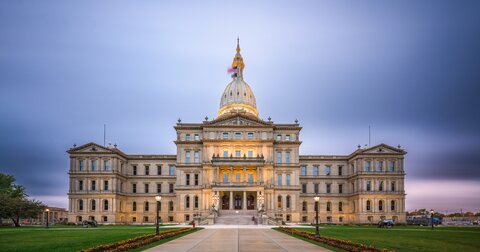The good, the bad and the ugly at the end of Michigan’s Democratic trifecta
And a bit of hope for 2025
As two years of full Democratic control of the Michigan Legislature come to an end, we can now look back on what the party accomplished. The first Democratic trifecta since before I was born enacted a litany of new laws that substantially raise costs on Michigan businesses and families.
The list includes:
- Hiking the income tax. Michigan became the only state in the country to increase income tax rates in recent years.
- Repealing the state’s right-to-work law. This is a $1,000-per-year hike on what workers in unionized firms are forced to pay.
- Higher energy costs that amount to $200 billion in total and hundreds of dollars per month to Michigan families, for increasingly bad service.
Over the past two years, Democrats (and a few Republicans) also voted for more than $4 billion in corporate welfare – select business subsidies, paid by everyone else to benefit a few. These programs have been a historic failure, creating only one out of 11 jobs promised. One of the latest deals saw taxpayers shell out $666 million to General Motors for fewer than 100 jobs.
It’s no exaggeration to say that corporate welfare was the highest priority of this Democratic Legislature, with $4.6 billion approved over the past two years and another $7 billion on the table.
So there was a lot of bad policy. And most of the “wins” for free-market believers in 2024 came from defeating bad ideas. Here’s what got killed ... at least for now:
- Billions in corporate welfare. Michigan’s entire corporate income tax brings in about $2.2 billion annually – but lawmakers have redistributed all of it, and then some, to a few select companies that mostly fail to create promised jobs.
- Proposed laws that would have dramatically raised the costs to hire anyone, including higher workers’ compensation, billions in paid family leave and union wage rates to build broadband and energy infrastructure. Bills that would have raised landfill fees and established a costly and complicated “cleanup” fee also died.
- Changes that would have blown even more holes in the pension systems. Lawmakers have been doing two very unfortunate things – putting less money into the pension systems (which are $40 billion in debt) and trying to expand them. One proposal to add corrections officers to the state police pension system passed, but bills to reopen the state employee and school systems failed.
- Several bills that would have repealed reforms to that system. These reforms came about after Detroit went through bankruptcy and nearly a dozen other cities needed emergency managers, largely because they negotiated bad union contracts.
- Punishing school choice. Some bills aimed at charter schools passed, but the worst of these discriminatory laws did not.
It’s unfortunate that the biggest policy “wins” of the 2023-24 legislative session amounted simply to stopping things that could have been worse. These two years saw Michigan squander a $9 billion surplus on spending that is making things more costly without improving services for citizens.
There was legislation, often supported by Democrats and Republicans, that would save tipped wages, fix the onerous paid sick leave law and create more housing supply in Michigan. Those items, as well as passing a sustainable budget, should be the first on the agenda in 2025.
Michigan Capitol Confidential is the news source produced by the Mackinac Center for Public Policy. Michigan Capitol Confidential reports with a free-market news perspective.


 We Wish You a Merry Lame Duck
We Wish You a Merry Lame Duck
 Film credits, SOAR renaming, other bills likely in lame-duck session
Film credits, SOAR renaming, other bills likely in lame-duck session
 More money, fewer riders for SMART system
More money, fewer riders for SMART system

 Michigan cities paid up to $63 million in police settlements from 2022 to 2025
Michigan cities paid up to $63 million in police settlements from 2022 to 2025
 State taxpayers fund local infrastructure projects
State taxpayers fund local infrastructure projects